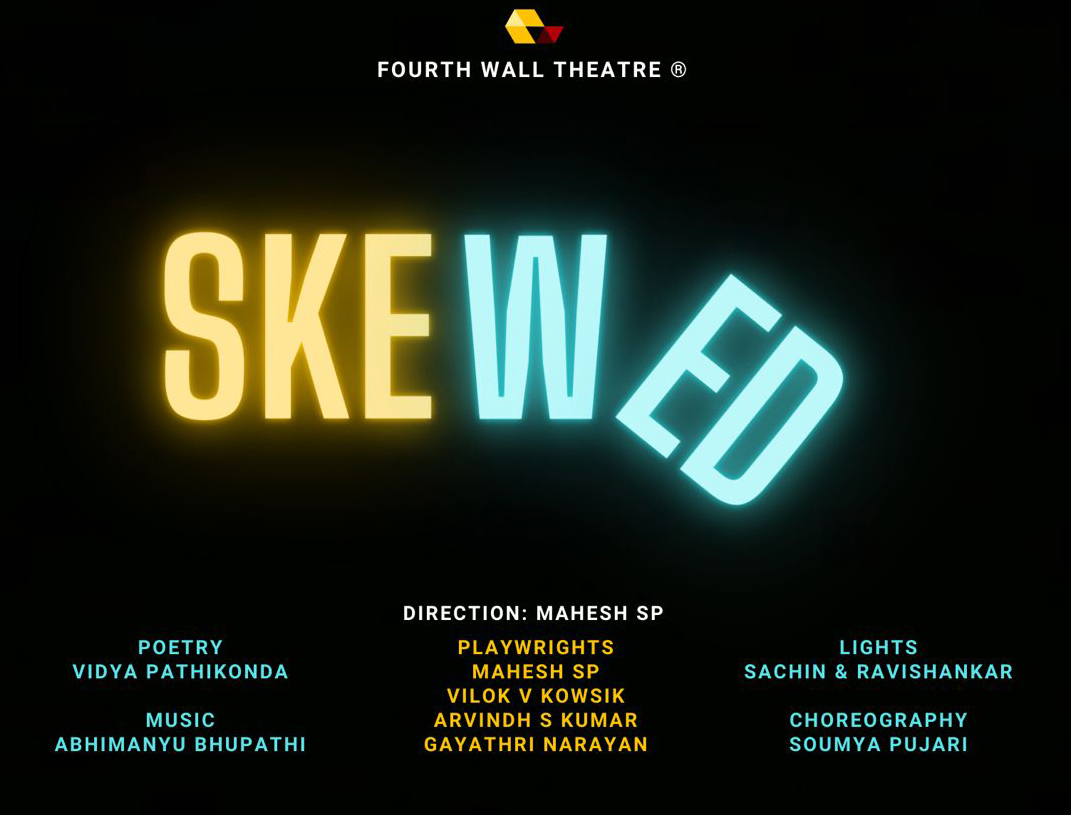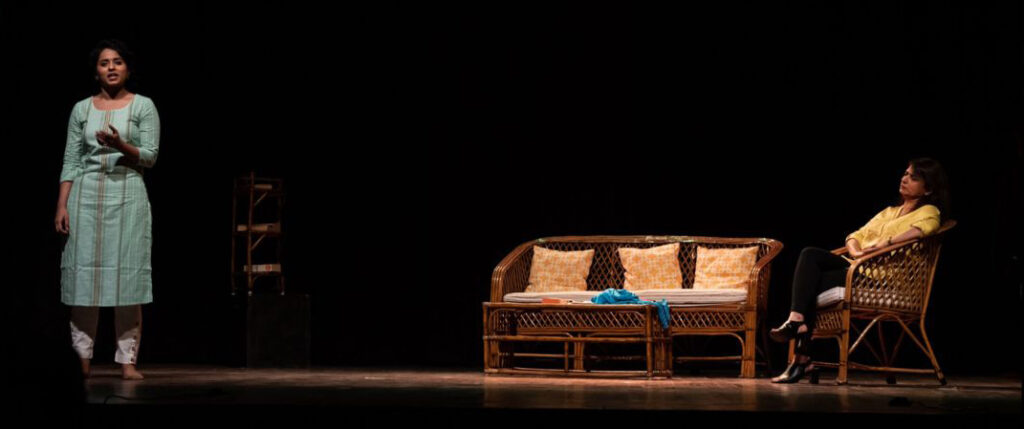On May 12, 2023, my son Swapnil (an 11-year old) and I went to Ranga Shankara to watch a play named “Skewed”, a production of Bangalore-based group Fourth Wall Theatre. We had bought the tickets on May 5 after getting to know about the event from the performers, who had been publicising this play in person in front of Ranga Shankara. I should confess that we discussed among ourselves a fair bit before taking the final decision – “if the actors and actresses have to promote the event themselves so profusely, how good would it be?”, we kept thinking. I should admit that we were worrying unnecessarily. I must also accept that we were eventually happy to be proved wrong. I would like to explain to you why and how we were pleasantly surprised. This review should be thought of as a personal take on this drama, and Swapnil has made significant contributions to it.
“Skewed” is a relevant piece of work that describes how lopsided narratives emerge influencing everyone and affecting the people on the wrong side of them. The story revolved around the untimely and unusual death of a young police officer posted in Coorg, a beautiful and mountainous region of Karnataka, and how his death lead to unfounded suspicion of his wife (Divya, played by Soumya Pujari) manufactured by people around her, two detectives (Pallavi, played by Kavita Jindal and Amar, played by Arvind S. Kumar) and, of course, the misogynistic media.
Two narratives were built around this unfortunate incident:
(1) Divya, the widow of the dead, had an affair with a police officer named Varun (played by Vilok V Kowsik), a junior of her deceased husband and they killed her husband together;
(2) Divya’s late husband had an affair with his friend and neighbour Sanjana (acted by Jeevika), who used to play hockey with him, and hence Divya killed him out of jealousy.
We really loved how the hockey culture of Coorg was used rather aptly and fiercely in this drama – the pace was perfect, the acting admirable and the stage-work sublime. Powerful performances by the main actors and actresses mentioned above, together with impressive theatrics of a few other characters (e.g., Abdul, played by Uttam, Kuliya played by Manikanta, Maid Gange, played by Sarika, Bharat constable, played by Arjun, etc.), gave rise to an immensely enjoyable drama that contained multiple Rhea-Chakraborty-saga-remembering goose-bump moments.
There are scopes of improvement, though, for some of the newer actors, whose dialogues were unclear in spite of the amazing acoustics of Ranga Shankara. However, I am ready to give them the benefit of doubt – perhaps they were slightly tense and nervous in their first play on one of the best stages of the country. I do hope they will improve and present us with many magical performances in the years to come.
There were a few scenes and messages in this play that touched our heart and hence I would like to detail them a bit in this review.
The first and foremost, there was a scene in which the senior detective Pallavi (played by Kavita Jindal) and Divya (the wife of the deceased – played by Soumya Pujari) had a conversation. It was supposed to an interrogation but it became way more than that – a prejudiced trial or perhaps a moral policing effort of a police officer. Effortless acting of two great performers turned this scene into one that will be cherished for good.
Second, at the beginning of the drama, Divya and police officer Varun (played by Vilok V Kowsik) had an important discussion that played a significant role in the story. Both of these scenes lead the way to a superb story that unfolded gently yet shockingly before our eyes and ears. The most magnificent scene was perhaps the one in which all the actors formed a parabola (roughly, a U-shaped curve) with Divya in the focus (in terms of lighting too) and Varun at the vertex. This was, by far, one of the best symbolic depictions of a meticulous media trial of an apparently innocent lady and her friends. The play ended on a positive note in a moderately open-ended fashion and yet with a very strong message – “we should not form opinions too quickly on anyone or anything”, as Swapnil articulates it.
We need more productions like this one, which will have the honesty and courage to criticize the malicious intent of many, including that of media and social media controlled, in many cases, by divisive people with selfish political agenda.
Skewed narratives not only destroy many lives, but also help disruptive forces to the stage for the execution of their shameless divide and rule policy. Expression of dissent and political discourse against the oppressors cannot limit themselves to a particular form – use of strong mediums such as songs, poetry, paintings, plays, etc. have historically been significant, especially during authoritarian regimes. Much to my dismay, today is no exception, and plays like “Skewed” provide a platform for common people to identify the crisis and build an opinion about it.
A lot of credit also goes to the script (by Mahesh SP, Vilok V Kowsik, Arvind S Kumar and Gayathri Narayan), poetry (by Vidya Pathikonda), music (by Abhimanyu Bhupathi), handling of lights (Sachin and Ravishankar) and choreography (by Soumya Pujari), and last but not the least, the excellent direction (of Mahesh SP), all of which, along with the amazing actresses and actors, contributed to this remarkable performance. As a result, it was a delight to be in the audience and I am not going to miss the next production of Fourth Wall Theatre.
(Parthanil is a professor at the Indian Statistical Institute Bangalore Centre. This article is based on the author’s personal experience and opinion)


